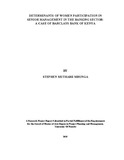| dc.description.abstract | Gender equality is a topic that has generated a lot of debate around the world.
Numerous research projects have been undertaken in the Social Sciences field in an
attempt to unravel concepts and their relationships in this field. This study sought to
investigate the factors that affect women participation in senior management within
the banking sector in Kenya, with a particular focus on Barclays Bank of Kenya. This
study was conducted in fifteen head office departments in Nairobi and five retail
branches in the Coastal region. The purpose of this study was to examine the issues
affecting women participation in senior management in Kenya’s banking sector using
Barclays bank of Kenya. It was guided by five objectives. The study sought to
establish the effect of gender-based stereotypes on participation of women in senior
management at Barclays Bank of Kenya. It also proposed to determine the
significance of gender roles in participation of women in senior management at
Barclays Bank of Kenya. The study aimed to assess the effect of educational level on
participation of women in senior management at Barclays Bank of Kenya. It also
sought to explore the effect of patriarchal corporate culture and participation of
women in senior management at Barclays Bank of Kenya. Finally it proposed to
determine the effect of the non-aggressive nature of women on participation of
women in senior management at Barclays Bank of Kenya. The study adopted a
descriptive survey design that involved both quantitative and qualitative approaches.
The data was collected using self-administered questionnaires given to both men and
women in both managerial and non-managerial job grades, within head office
departments and the five branches in the Coastal region. The target population was
998 Barclays Bank of Kenya employees. The sample size was 94 employees. Data
analysis was carried out by use of SPSS software and the results presented in form of
tables and figures enhanced by succinct narratives to bring out the salient themes. The
study concluded that gender based stereotypes swing unfairly against women and may
negatively influence appointment of women to leadership positions in the banking
sector (χ2 = 31.473, P = 0.0012). Additionally, gender roles were found to affect the
appointment of women to key leadership positions as women were committed to child
bearing and other marital roles at the expense of their careers (χ2 = 3.286, P = 0.0035).
The education levels of women were found to be slightly higher than men, though the
perception of male respondents was that women academic abilities were inferior (χ2=
22.462, P = 0.000). Patriarchal corporate culture was also found to negatively impact
the appointment of women to senior management positions due to multiple conflicting
demands (χ2 = 1.374, P = 0.0054). The question of how non aggressive nature of
women affects their participation in senior management could not be conclusively
answered because there was found to be no significant relationship between those two
variables (χ2= 2.427, P = 0.788). However most of the males in the non-management
sample (47.8%) felt that women lacked sufficient competitive appetite, while most of
the females in the same sample (45%) disagreed or strongly disagreed with this
notion. Finally the study made recommendations to the management of banking
institutions with regards to the career progression of female employees within their
ranks. The study proposed flexible working hours to be encouraged in the banking
sector especially for nursing mothers to manoeuvre their familial schedules. The study
also proposed a review of the banking profession as a whole to remove operational
processes and procedures that make banking a stressful, tedious career. Finally the
study proposed regulatory directives as a possible strategy to eliminate tokenism. | en_US |

